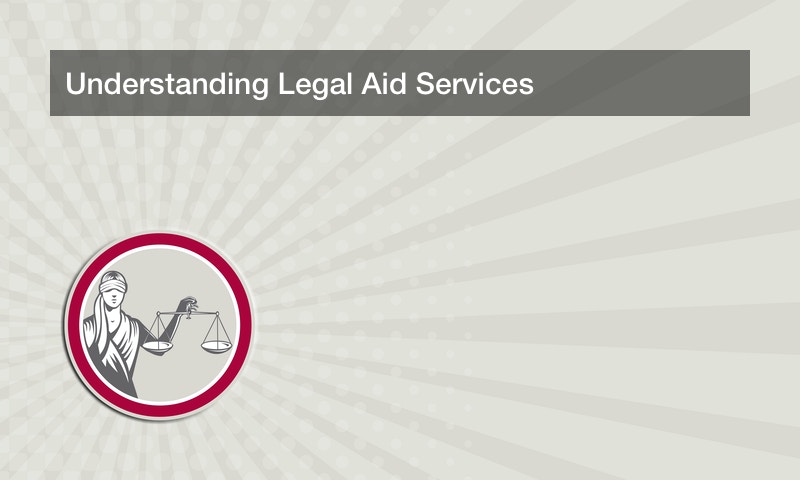
Every state offers some sort of legal aid services to help offset the cost of legal services, however, legal aid services are limited in the support that they offer. For example, in some states, legal aid services provide criminal law support and representation, in other states they do not. Some states the legal aid services include representation for child support matters and life insurance settlement paperwork, but in others, they do not.
There is no blanket rule for what legal aid services are provided but in most cases, legal aid services can either answer legal questions for you or they can refer you to an agency or organization that can.

Legal aid services are available in every state but not every state is as generous as others when it comes to the services that they provide. The Legal Aid Society, the primary organization that provides legal aid services in the US was founded in New York City in 1876.
Legal aid services are pretty comprehensive in the northeastern United States compared to other areas of the US, like the south, and Midwest, largely in part because of the long-standing history of the Legal Aid Society.
The Legal Aid Society is a well established non-profit in the North Eastern United States that enjoys a great deal of support from a wide range of benefactors including exceptionally large profitable law firms, law schools, and philanthropists, but that is not true for many legal aid services across the US.
The Services that are Almost Always NOT Covered
If you are dealing with anxiety about child support, your legal aid services office can likely help, but if you are dealing with a matter where you are looking for an attorney that can detect fraud, your legal aid services likely cannot help.
Legal aid services are usually offered to indigent clients that cannot afford to pay an attorney to help with contracts, criminal defense, landlord-tenant cases, and other types of legal matters. There is a long litany of cases that legal aid services do not get involved in including:
- Personal injury cases
- Corporate litigation cases
- Adoption cases
In most states, legal aid services do not have an adoption lawyer on staff, and they will not help with the matter. If you have been in a car accident, injured by a faulty product, or have some other personal injury matter legal aid services will not get involved.
If you are suing a company legal aid services will not handle the matter, they do not get involved in corporate litigation even when the case involves a public health threat like the opioid epidemic. It is just not something legal aid services handle.

To understand why you may be rejected by the legal aid services in your area, you need to understand the ideology behind legal aid services. They are not there to help people gain from instituting court actions or to detect fraud. They are there to even the playing field for people that cannot afford a lawyer.
A car accident case is an excellent example of the type of case that legal aid services do not take on. A car accident claim typically results in the claimant receiving a lump sum payment of some sort to settle the claim. These types of cases are typically accepted under contingency terms by attorneys that specialize in car accident claims. The contingency of the retainer is that the client does not have to pay upfront for representation. The lawyers are paid when the claim is paid out by the insurance company.
Legal aid services are free services and would not take on car accident cases simply because there is no reason why anyone would need free services for this matter. You do not have to have cash on hand to hire an attorney to represent you in a car accident claim.
The same is true in malpractice cases. The case is taken on a contingency basis. The client pays no money out of pocket upfront which means anyone can afford an attorney. You do not have to pawn your wedding band to hire an attorney for these types of cases but it also means you will not get support from your legal aid services.

One of the reasons legal aid services, outside of the northeast, does not offer a full scope of legal services is because typically these offices work on a shoestring budget. They have limited resources, are often short-staffed, and completely overwhelmed with cases.
Many legal aid services are so underfunded that they may only have one or two staff lawyers, and the rest of the staff are paralegals, volunteers, and in many cases law students. The paraprofessionals and volunteers do the majority of the leg work, research, and intake. The attorneys focus on court matters.
What Do They Do?
After reading through all the things that legal services don’t do, the question begs to be asked: “what do they do? “. Most legal aid services help lower-income families to navigate through family court, landlord-tenant court, understand contracts, understand their rights, and focus on community-based problems.
For example, if grandma is in a senior living long term care situation and she wants to make you her health care power of attorney, legal aid services can help with that. They can file the necessary paperwork for you. If your landlord is threatening to evict you and they have refused to make repairs, they can help you with that.
There are plenty of services that they do provide. They are often the place that people go when they are in desperate need because they do not understand something that is going on in their life that involves the courts.
The Process
Almost every single legal aid services organization has a process in place that you need to follow to determine if you are eligible for help. In almost all cases, services are income-based. You will have to fill out an intake form.
The intake form will ask basic questions about who you are, your income, and what you need legal support for. The intake worker will ask you a few questions and will be able to let you know right on the spot whether you qualify to meet with a caseworker to move on to the next step in the process.
If you do not meet the income requirements the intake worker will give you options for potential community resources that may be available. If you do meet the income requirements, you will move on to the next step in the process.
The next step is to meet with a caseworker. The caseworker will discuss the matter with you and give you options for your case and how it will be handled. In some cases you will meet with the attorney and the attorney will go over your case.

The clear benefit of legal aid services is that you can get the legal support that you need for free whether for a life insurance settlement or a more complicated case. Legal aid services are also a great resource for legal information. They usually have a litany of resources in the community that can help in many different areas of your life.
One of the goals of most legal aid services is to improve the community and to help ensure that the members of the community get the justice that they deserve. They are usually fairly active in legislative actions that affect the poor, homeless, and those that have criminal convictions.
They can be a great source of information for people that have been recently released from jail on parole or are on community probation. They can typically answer questions about your rights and help you to navigate the system.
If you are lucky enough to live in an area where the legal aid services have a big budget and plenty of staff, you can enjoy a range of comprehensive legal services for free.
They are often the headquarters for community action groups that are fighting to make the community a better place to live. They are a hub of valuable information about programs for community members. Legal aid services bring a lot of good things to the communities they serve.
Nothing Ventured Nothing Gained
If you are reading this and are struggling with a legal issue, the first thing you should do is look for your local legal aid services office, even if you think your income is above the threshold. It never hurts to apply for services, you never know, you may be eligible even if you think you are not.
Worst-case scenario you are denied for services because your income is over the threshold, but you may get a lead on other legal services that may work on a sliding scale. Some states have very low-income thresholds for free services, but do offer services on a sliding fee scale based on your income.
Sliding scale fees can be very affordable and it can help you to get the representation that you need. Your first step is applying for services through your local legal aid services. If your state does not offer a sliding scale fee system for legal services, the legal aid may be able to refer you to a fair priced attorney to help with your matter.

There are a few things you should do if you want to apply for help with your legal aid service to ensure that you can move through the process quickly:
- Bring proof of income to your intake meeting
- Have ID and any notices
- Plan to spend a few hours
Since most legal aid programs are based on income be sure that you bring proof of income to your first meeting. If you are in a senior living situation or receive disability payments, bring your award letter, if you work, bring your last three paystubs.
Make sure that you are honest about your income, not disclosing income can get your barred from receiving help. Bring income for everyone in the household that works or receives a regular monthly payment.
ID And Documentation
Bring your state-issued ID with you to prove who you are. Bring any notices that you have received regarding the case. It is important that you have everything that you need for your first appointment, especially in the case of a pending eviction or other emergent situation. The more documentation you have of the matter with you the better.
Be Patient
This is a case of you get more flies with honey than you do with vinegar. Plan on being there for a few hours. If you have children see if you can get a sitter. Bring something to read. It can be easy to get frustrated, but getting frustrated is not going to get you the support that you need.
There are many people in your community that are in similar situations, and they there to get help too. It takes time to ensure that each client gets the help that they deserve. Be patient.

Millions of people are served each year by legal aid services. They find the support that they need to navigate a wide range of legal situations with minimal stress and anxiety. One of the most important jobs of legal aid services is to protect the rights of people that would be overlooked if not for the services.
Every person that works for one of these organizations does so with the best interest of their community at heart. They fight a good fight every day to ensure their community members are protected in a sometimes very chaotic legal system. They provide a valuable service.




